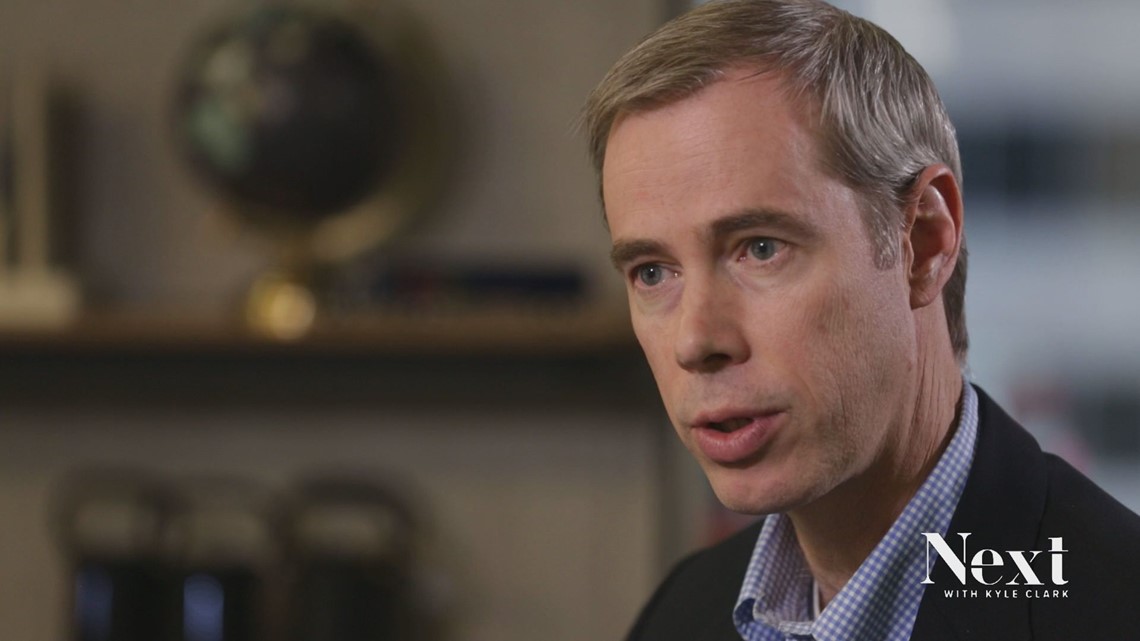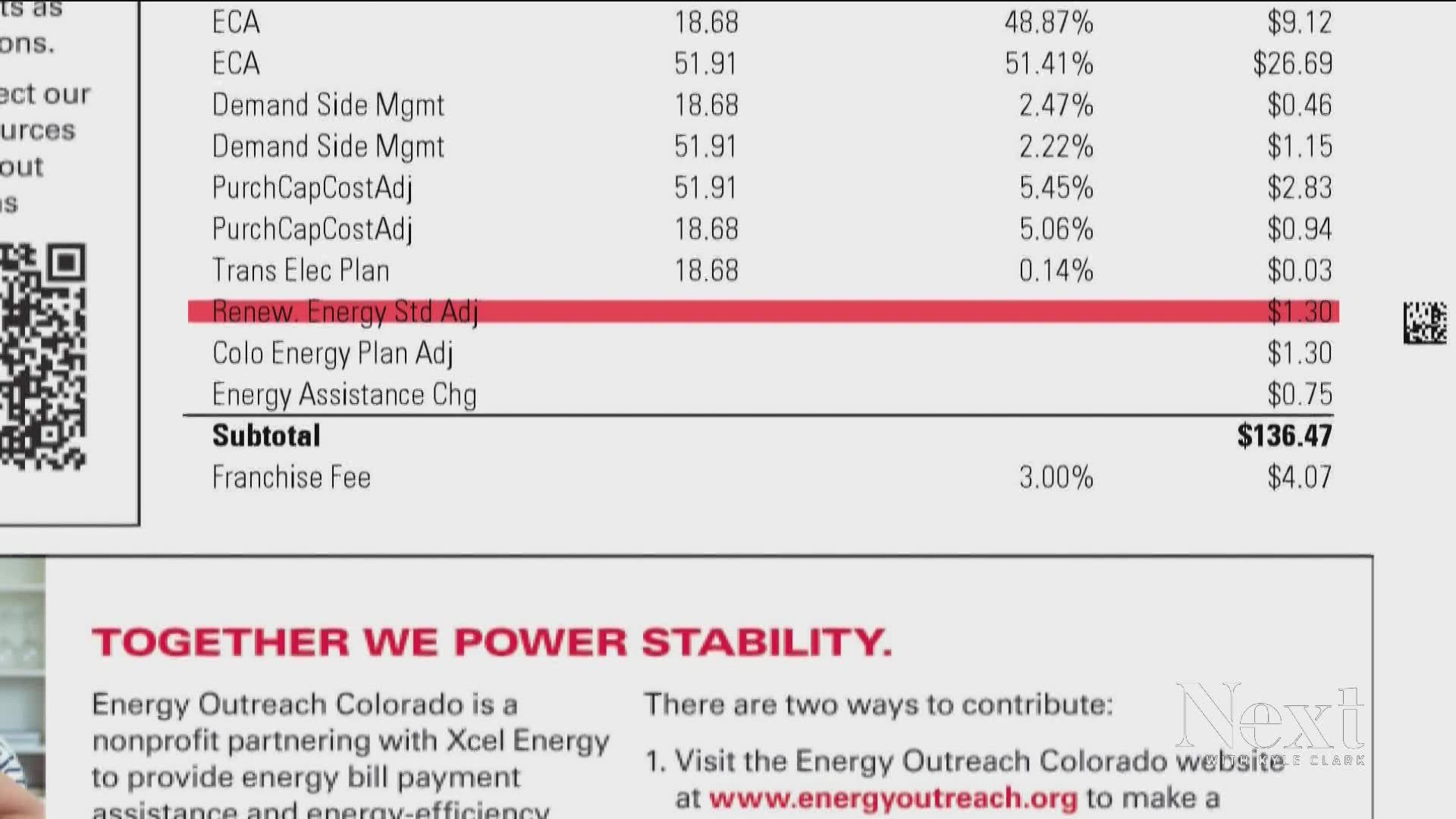DENVER — If there is one topic that unites us all, it is outrage over Xcel Energy bills that are double or triple what they were this time last year.
Understanding what each item is that you are paying for takes some time. That is why we did this story breaking down each charge.
But why are some of the charges on your bill?
The biggest charges on your Xcel bill are related to the cost of generating and using electricity and natural gas.
Energy usage and cost of gas are the drivers of outrageous Xcel bills this year.
The following chart is provided by Xcel, which shows how much the company paid for natural gas at the end of 2021 and start of 2022 (left side) versus the end of 2022 and start of 2023 (right side).


Instead of paying that much in the moment, why does Xcel not bare any risk for not planning better, like buying and storing gas when it was less expensive?
Here is a question and answer session between 9NEWS reporter Marshall Zelinger and Jack Ihle, Xcel Energy Regional Vice President of Regulatory Policy:
Marshall Zelinger: "Isn’t that the risk of stockholders, like 'Oops, it was really cold in December, customers used a lot of energy to heat their homes, we’re going to miss out on some money that we thought we were going to have?"
Jack Ihle: "On these fuel cost pass-throughs, and that’s what we call them, because we earned zero profit, we make zero margin on those. We don’t make money on those, so we pass those through to customers. It’s essential for the financial health of the company, to not bear a liability for something that it earns no profit on. If it becomes a pattern where we’re bearing a liability, then it will become a more costly to operate this company, and it’ll become more costly to attract investors and that will simply drive customer costs up, customer rates up."


MZ: "On the first [billing] charge, 'service and facility' -- at some point, haven’t I paid off the equipment that’s on my home that that number should go down? Or, I heard I’m paying for customer service. Isn’t that an expense of Xcel? Why am I paying for Xcel to employ customer service through the 'service and facility' charge?"
JI: "It’s partially capital, meaning the cost of the meters, those depreciate over time, they need to be replaced. It’s averaged across all the customers, so every year we’re going to replace new meters. So, there’s always an ongoing cost. We have 1.5 million of these meters out there, part of that is becoming smart meters, those are turning over now, but they will depreciate, wear out. There’s a certain amount of those meters that will be replaced every year, so that cost is ongoing. The cost to maintain the support systems, like customer care accounts, that’s ongoing as well. That doesn’t come for free to us, and so we do seek to recover those costs from customers."
MZ: "Are these bills as simple as they can be to understand?"
JI: "Probably not. I would say there’s a really strong emphasis on transparency and letting people know. And an emphasis on detail because there are a lot of interesting public policy items, such as the renewable energy standard adjustment, and the transportation electrification plan adjustment, and the energy efficiency adjustment."
JI: "When you have more information, that’s more transparent and more detailed, it’s inherently more complex, and I think that’s the tension here."
MZ: "The adjustments that you just referenced, why does the customer have to pay for that? Viewers are asking, 'What’s Xcel’s risk? Doesn’t Xcel spend money?' We’ve heard a lot about, 'Well, Xcel spent this and customers pay it back,' why am I paying?"
JI: "Xcel has been driven by a lot of directives from the Colorado legislature. For instance, to do things like promote electric vehicle adoption and promote distributed renewable energy adoption and promote energy efficiency. And so often that is directed by the Colorado legislature as public policy goals that are deemed to be valuable to pursue, and so we pursue them, we create plans, again those plans are brought up before the commission in a litigated proceeding, and then there’s a cost recovery mechanism that becomes a line item or a rider on that bill that shows the customers what they’re paying for."
We took that claim to State Senate President Steve Fenberg (D-Boulder) as he deals with energy policymaking.
"When a company like Xcel, says our utility rates are going up because the legislature made us do all these renewable things, I think that's baloney because transitioning to renewables should be, actually, a cost-saving measure. But, of course, a for-profit, publicly traded huge company is always going to find ways to make money off of every investment they make. That is their job, but we have to do a better job as a legislature to hold their feet to the fire and make sure that ratepayers are being looked out for," Fenberg said. "The allowance for Xcel Energy to invest money in electric vehicle stations, charging stations and whatnot, and then get reimbursed by ratepayers for it, that was a bill that they largely wrote and lobbied for."
SUGGESTED VIDEOS: Full Episodes of Next with Kyle Clark

